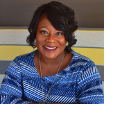
A Message from Ujima Donalson
Assistant Vice President, Total Talent Management
This spring, due to a variety of circumstances, I have been away from the office to an unusual degree. Although my mind is rarely far from my work, the distance imposed by this absence has provided a fresh perspective on my leadership style as well as the challenges of leadership today.
In POD, we regularly hear from leaders and administrators across the University. You all are our stakeholders, and through The Leading Edge we strive to connect you with pertinent resources, keep you up-to-date on management trends, and share tools and strategies for individual and organizational excellence. To that end, for this issue we have curated content from the last several years to bring you articles that are not just insightful but still highly relevant. Whether you’re new to a leadership position here at the UW, missed the article the first time around, or simply have a few moments now to stop and take stock, I hope these articles will prove useful.
As far as how my perspective has shifted, I’ve thought quite a bit about how much of our leadership is an extension of ourselves. Leaders can hold very similar organizational objectives and yet manage in very different ways. Our leadership style is intrinsic and often unexamined. I grasped that when I first took the Core Strengths Accountability workshop (which is also discussed in this issue) as a participant and it was reinforced as I became a certified Core Strengths facilitator. Now, having delegated oversight and authority to various people this spring, I am newly aware of how deeply our personality traits and value systems influence how we operate, interact, and make decisions.
I’ve also been giving a lot of thought to the importance of role clarity. When I was first put in charge of POD, I worked to distinguish and untangle roles and ensure that ownership of various programs and projects would be transparent and understood by all. For this reason, at any time I can trust my team to achieve the work that is needed on a day-to-day basis. That said, as the head of the new Total Talent Management unit in UWHR, I am now overseeing more people and teams, and in many ways our newly formed team is still in the “norming” phase—still refining and defining various protocols and roles. This isn’t surprising or unhealthy; it’s part and parcel of the growing pains we experience with change. As I first did with POD, with Total Talent Management I have needed to shift into a position of learning about programs and people from the ground up, to entrench myself and to pay attention to all the details because as leaders we can only make evident to others what is clear to us.
Finally, I’ve realized how hard it is to step away and unplug, even when your health and your life outside of work demand it. My team members have been working hard to respect boundaries and only involve me when absolutely needed. However, with the close relationships we have built on my team, it is hard for all of us—including myself—to pull away completely.
Furthermore, this is a busy time and I am finding a greater need to stay connected than I may have anticipated. It is simply reflective of the work/life balance many of us struggle with. As a leader, I champion a healthy work/life balance for my employees, but I know I don’t always model that balance. Don’t get me wrong; I am able to unplug for recreation for a short time, which is so important, and come back with a renewed perspective.
In truth, my real struggle is that I find it hard to separate myself as a leader—as a key person responsible for my team and its success—from myself as an individual outside of work. I think for some of us that will always be the case; how I lead and how I connect with my team is simply a part of me. I could struggle with that or fight it. However, I believe that accepting that as my truth, and more fully understanding my own style, values, and motivations, will only help me approach my work and my life in a more intentional, satisfying, and healthy way.


